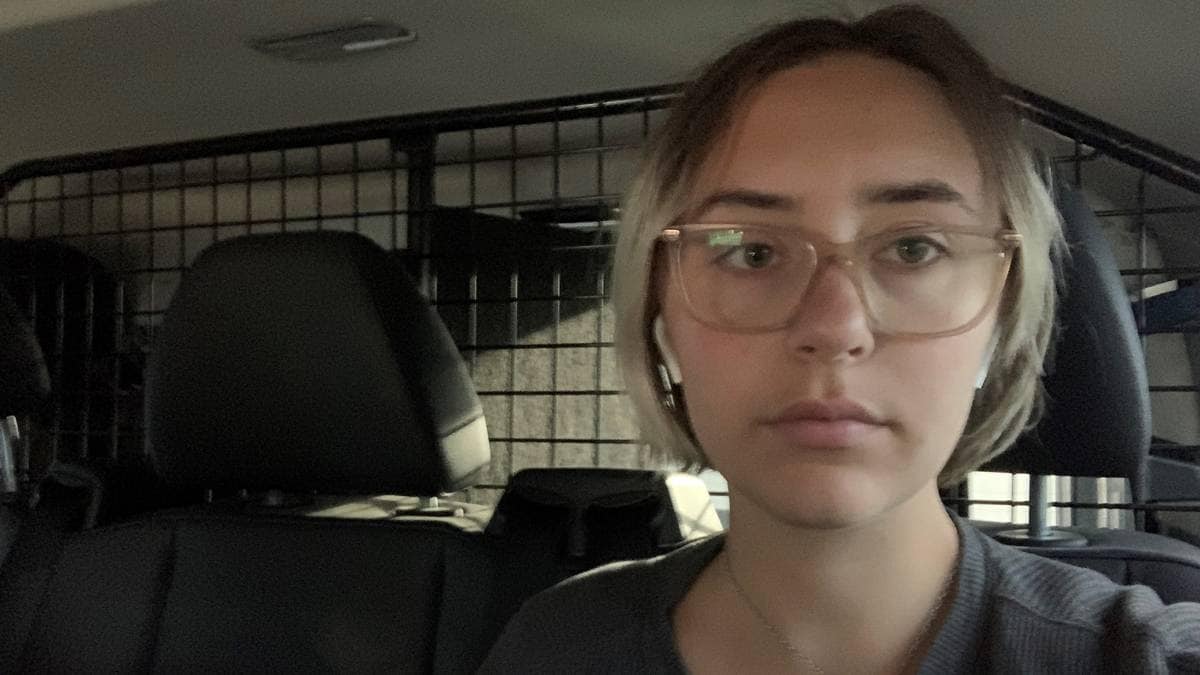[TL note: This article was originally written in Nynorsk. My own dialect is generally written in Bokmål.]
Juliana Mattson was deported from Norway while she was participating in a cultural exchange program. Her case has now become a topic of debate in the Storting, Norway's parliament.
Summary of the issue
- Juliana Mattson, a student from the USA, was deported from Norway while she was participating in a cultural exchange program on a small farm in Innlandet county.
- The Norwegian Directorate of Immigration (Utlendingsdirektoratet; UDI) believed that Mattson had taken up work on the farm, which led to the deportation.
- Storting Representative Alfred Bjørlo from the Liberal Party has reacted strongly to the case and is questioning Minister of Justice Emilie Enger Mehl.
- Bjørlo doubts that the legal framework actually puts a stop for the activity that WWOOF offers, and believes that the incident could have been the result of a misinterpretation of the law by UDI.
- Storting Representative Rasmus Hansson from the Green Party also criticizes UDI's actions in this case.
- The case is now being reviewed by the Ministry of Justice.
This summary was written by an AI service from OpenAI. The content is checked for quality by NRK's journalists before publication.
Last week, NRK wrote about 22-year-old Juliana Mattson from the USA, who was taken by Norwegian police from a small farm in Innlandet county and then deported from Norway.
The cause of the deportation was that the Directorate of Immigration (Utlendingsdirektoratet; UDI) believed that Mattson had taken up work on the farm.
This, despite the fact that Mattson was on the farm because she was participating in a cultural exchange program led by the organization Worldwide Opportunities on Organic Farms (WWOOF).
Worldwide Opportunities on Organic Farms (WWOOF)
- Worldwide Opportunities on Organic Farms (WWOOF) is a globe-spanning movement aiming to build bridges between organic farmers and those who want to visit them.
- The organization mediates the exchange of culture and knowledge and is a global community working for organic farming around the world.
- It is not possible to offer nor receive a wage as a participant in a WWOOF-exchange.
- WWOOF was founded in 1971 and is one of the first educational and cultural exchange programs in the world.
- WWOOF today operates in more than 132 countries around the world (and is growing constantly)
- There are 145 farms in Norway today offering stays through the WWOOF-network. They generally take 2-4 "wwoofers" at a time, most of them arriving in the summer.
- In Norway, non-Schengen citizens must have a work permit to come to the country through WWOOF. No other country in Europe has this requirement.
Source: WWOOF NORWAY
Alfred Bjørlo of the Liberal Party reacts strongly to this affair.
– "This is hopeless. We can't let Norway deport people taking part in a serious international exchange program to learn about agriculture," Bjørlo said to NRK.
Questions for the Minister of Justice
– "Does the Council of State believe that participation in this type of exchange program in Norway, as the only country in Europe, should be equated to immigration for work, such that people risk arrest and deportation from the Schengen Area?"
This quote is from a letter that Bjørlo wrote to Minister of Justice Emilie Enger Mehl (Centre Party) dated to the 9th of September.
[TL note: "Centre Party" refers to "Senterpartiet", as opposed to "Center Party" which refers to the much newer and much less successful "Partiet Sentrum".]
Bjørlo's question is now being reviewed by the Ministry of Justice.
Alfred Bjørlo strongly doubts that the legal framework actually puts a stop to the activity that WWOOF offers.
– "The first thing we will ask the government about is if this was because of a block in the legal framework, or if this is about how the law is handled by UDI. If this incident happened because of a misinterpretation of the law by UDI, then I expect the government to take this up with UDI," he said.
For the stay was not intended as work, neither by Mattson, nor by the hosts from the organic hobby-farm in Eidskog. They have accepted wwoofers to that farm for over ten years.
The plan was for Mattson to stay on the farm for two weeks.
– "I was just helping out a little with the board and lodging," Mattson said to NRK just after her deportation in August.
– "That was a part of a practical education in sustainable agriculture. It wasn't work, I was there to learn," she continued.
For according to WWOOF's guidelines, there should not be any form of wage in connection to these types of stays.
Nevertheless, the stay on the farm was defined as employment by UDI.
In the official decision to deport Mattson, UDI pointed to among others section 55 in the Immigration Act where it says that a foreign national who is to work in Norway must have a work permit that gives one the right to employment.
"The seriousness of the situation is exacerbated by that the illegal work can be connected to workplace criminality. Following from this, general preventative considerations and considerations for the legal consensus point to that you should be deported." — UDI
Bjørlo believes that if the law bans this type of practice, that the law should be changed.
– "It must be possible to find a way to open our borders for this type of activity as an exception, without allowing for illegal migrant labor," he said.
[TL note: the original said "the Storting representative" rather than "he", but to me this was a bit clumsy to translate literally.]
Poll: What do you think of the deportation of Juliana Mattson?
Results as of 5:24 PM 9/12/2024:
- 6% — It's completely just, one must follow the law no matter what.
- 10% — It's very unfortunate, 😥 but UDI needs to follow the law.
- 80% — This is just sad! UDI surely has bigger things to worry about! 😡
- 4% — I have no opinion. 🤷
Read also: Mother of three deported from Norway, very difficult for the children
"Unreasonable consequences"
Storting Representative Rasmus Hansson of the Green Party is also not particularly impressed with how UDI has interpreted the law in connection with this case.
– "Where on Earth is UDI's understanding of people? This is rigid, bureaucratic nonsense with completely unreasonable consequences," he wrote to NRK.
Hansson is clear about why he believes this.
– "What Juliana Mattson was to do in Norway is 100% positive. She was nothing but a good contributor to Norwegian agriculture bothering neither the state nor the people of Norway. It is pretty hopeless that UDI would pour out buckets of public resources to chase her out of the country," the Green politician said.
NRK has been in contact with the Ministry of Justice to ask Minister of Justice Emilie Enger Mehl about the case. The minister says via the communication department that she cannot answer before she has answered Alfred Bjørlo's question in the Storting.
Immigration Act section 55
A foreign national who intends to take up employment with or without remuneration or who wishes to engage in business activity in the realm must hold a residence permit giving him or her the right to take up employment or engage in business activity, unless otherwise provided in or in accordance with this Act.
A foreign national who intends to take up residence in the realm for more than three months without taking employment must hold a residence permit. Residence in another country participating in cooperation under the Schengen Agreement is equivalent to residence in Norway. The King may issue regulations containing further provisions on calculation of the period of residence.
[TL note: Translation courtesy of Lovdata]
Appendix: Image captions from the article
DISAPPOINTED: Juliana Mattson is very dissatisfied with the treatment she received in Norway.
Alfred Bjørlo (Liberal) hopes that the government takes measures to ensure that a similar incident will not happen again.
Rasmus Hansson (Green) believes that the deportation is a result of outdated bureaucracy.
BACK IN THE USA: Juliana Mattson is now back home with her mother and cat in Rhode Island in the USA. She is still disappointed about what happened in Norway. She says that she will probably go on another WWOOF exchange a different time, but not to Norway.
Åklangenga is an organic hobby farm that cultivates vegetables and holds sheep for their own use. About ten youths visit the farm each year to learn about organic farming.
Toni Poleo is associate professor in ecology, agriculture and biotechnology at the Inland Norway University of Applied Sciences. At the farm he and his wife show circular agriculture in practice to youths from around the world.
The Old Norwegian Short Tail Landrace is descended from the Old Norwegian Sheep, the progenitors of the Norwegian Short Tail Landrace breeds of today. Sheep are an important part of the Åklangenga farm.
André Lemee from Normandy is also at Åklangenga farm through WWOOF. But since he's from the EU country of France, he can stay on the farm as long as he wants.
Julia Hurter grew up in the USA, but is also a Norwegian citizen. She went to Åklangenga for two weeks in May through WWOOF, and is now back on her own initiative.


